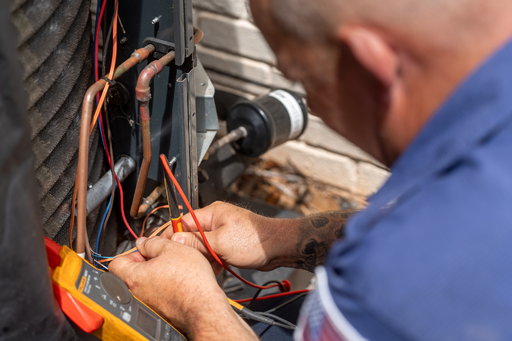When it comes to maintaining comfort in your home, your HVAC system is the unsung hero, tirelessly working to keep temperatures just right. But have you ever wondered if giving your system a break before adjusting it further could help its performance or longevity? It’s a common question that many homeowners face: Should I let my HVAC system rest before turning it down even more? And if so, for how long?
Understanding the balance between efficient use and wear and tear is key to ensuring your system runs smoothly. In this post, we’ll explore whether your HVAC system really needs a break and offer practical advice on how to manage it for optimal performance.
Understanding How Your HVAC System Works
Before diving into whether your HVAC system needs a break, it’s essential to understand how it works. HVAC stands for Heating, Ventilation, and Air Conditioning, and it’s designed to maintain the temperature and air quality in your home.
Your HVAC system includes a variety of components like a furnace, air conditioner, ducts, and thermostat. These components work together to heat or cool your home based on your settings. When you adjust the thermostat, your HVAC system responds by either heating or cooling the air to reach the desired temperature.
Do HVAC Systems Need to Rest?
The idea that an HVAC system needs to rest might come from the fact that many appliances or machines perform better with breaks. For example, running a car for too long without stopping can lead to overheating or other issues. However, an HVAC system is designed differently.
HVAC systems are built to run continuously for extended periods. They’re engineered to handle the demands of maintaining your home’s temperature throughout the day and night. However, this doesn’t mean they’re invincible. Overworking your HVAC system can lead to wear and tear over time, which is why regular maintenance is so important. But in terms of needing a “rest,” your HVAC system doesn’t require one in the same way a car might.
When You Should Let Your HVAC System Take a Break
While your HVAC system doesn’t necessarily need a break before you adjust the temperature, there are times when letting it rest can be beneficial. Here’s when it might make sense to ease up on your HVAC:
1. Mild Weather Conditions
During spring and fall, the weather is often mild, and you may not need to rely on your HVAC system as much. This can be an excellent time to give your system a bit of a breather. By opening windows and allowing natural ventilation, you can reduce the workload on your HVAC system, potentially extending its lifespan.
2. When You’re Away from Home
If you’re going to be away from home for an extended period, it’s a good idea to let your HVAC system rest by setting the thermostat to a more energy-efficient temperature. For instance, in the summer, you could set the thermostat a few degrees higher, and in the winter, a few degrees lower. This not only reduces strain on the system but also saves on energy costs.
3. During Maintenance or Repairs
If you’re scheduling maintenance or repairs, your HVAC system will naturally take a break during that time. This is an excellent opportunity to ensure that everything is working smoothly and to address any potential issues before they become significant problems.
How Long Should You Let Your HVAC Rest?
If you decide to give your HVAC system a break, how long should it be? The answer depends on the situation:
1. Mild Weather Conditions
During mild weather, letting your HVAC rest for several hours at a time can be beneficial. For instance, you might choose to turn off the system during the day when the temperature is comfortable and only turn it on in the evening if needed.
2. When You’re Away
If you’re leaving home for a few days or even longer, it’s safe to let your HVAC system rest for the entire duration of your absence. However, be mindful of any specific temperature requirements, such as preventing pipes from freezing in the winter.
3. Short Breaks for Energy Efficiency
Even if you’re at home, you can give your HVAC system short breaks throughout the day. For example, if you’re heading out for a few hours, you can set the thermostat higher or lower depending on the season, reducing the strain on the system without turning it off completely.
The Impact of Constantly Adjusting Your Thermostat
One question that often arises is whether constantly adjusting the thermostat can harm your HVAC system. The answer is nuanced. Frequent adjustments can cause your system to cycle on and off more often, leading to increased wear and tear. This process is known as “short cycling,” and it can reduce the efficiency of your HVAC system over time.
To avoid short cycling, it’s best to set your thermostat to a comfortable temperature and leave it there. If you know you’re going to be away or want to adjust the temperature, consider using a programmable thermostat. These devices allow you to set a schedule for temperature changes, reducing the need for constant manual adjustments.
The Role of Regular Maintenance
Whether or not you decide to let your HVAC system rest, regular maintenance is crucial to keeping it running smoothly. Routine maintenance tasks include changing filters, cleaning ducts, and checking for any potential issues. By staying on top of maintenance, you can ensure that your HVAC system remains efficient and reliable, regardless of how often you use it.
How to Optimize Your HVAC System’s Performance
If you want to get the most out of your HVAC system, consider these tips:
1. Use a Programmable Thermostat
As mentioned earlier, a programmable thermostat can help you manage your HVAC system more effectively. By setting a schedule, you can optimize energy use without constantly adjusting the temperature manually.
2. Seal Windows and Doors
Drafty windows and doors can cause your HVAC system to work harder than necessary. By sealing any gaps or cracks, you can reduce the amount of work your system has to do, potentially extending its lifespan.
3. Upgrade Your Insulation
Proper insulation is key to maintaining a consistent temperature in your home. If your home is poorly insulated, your HVAC system will have to work overtime to keep things comfortable. Upgrading your insulation can make a significant difference in your system’s efficiency.
4. Invest in Energy-Efficient Equipment
If your HVAC system is old or outdated, upgrading to a more energy-efficient model can save you money in the long run. Modern HVAC systems are designed to be more efficient, reducing energy consumption and lowering your utility bills.
What’s the Verdict? Should You Let Your HVAC System Rest?
So, should you let your HVAC system rest before turning it down even more? The answer is that it’s not necessary in most cases. HVAC systems are built to handle continuous use, and they don’t require breaks in the same way other machines might. However, there are situations where easing up on your system can be beneficial, particularly in mild weather, when you’re away from home, or during maintenance.
The key is to find a balance that keeps your home comfortable while minimizing wear and tear on your system. By using a programmable thermostat, staying on top of maintenance, and optimizing your home’s insulation, you can ensure that your HVAC system runs efficiently for years to come.
Need Help with Your HVAC System?
If you’re still unsure about how to manage your HVAC system or if you’re experiencing issues, don’t hesitate to reach out to us at Horne HVAC Charlotte. We’re here to help you with all your heating and cooling needs, whether it’s maintenance, repairs, or a new installation.
Our team of experts is ready to provide you with the best advice and service to keep your home comfortable year-round. Give us a call today, and let’s ensure your HVAC system is in top shape!













